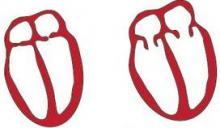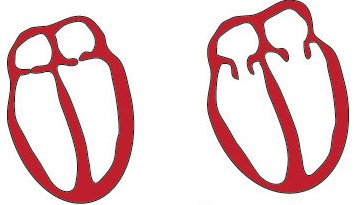User login
A racing heart may suggest pleasurable excitement, but the medical reality is that high heart rate can trigger hypertension and cardiovascular disease. Now, evidence for the first time also implicates a high number of beats per minutes in recent stroke patients in causing increased mortality, disability, and cognitive decline.
Although the new findings come from a post-hoc analysis of a big study, with about 20,000 patients, and so can’t be considered definitive, the strong suggestion that stroke patients with high heart rates have a significantly increased risk of death, reduced functional capacity, and dementia should pave the way for a prospective, controlled intervention trial.
When the results of the new analysis were reported last month at the annual congress of the European Society of Cardiology (and simultaneously published), it sounded like the next step would be a clinical trial designed to look at the outcomes of stroke patients who receive ivabradine, a drug that can safely and specifically slow heart rate.
To study the implications of a high heart rate in stroke patients, Dr. Michael Böhm and his associates analyzed data from 20,165 patients who had been enrolled in a treatment trial within 4 months after an ischemic stroke. That study, the Prevention Regimen for Effectively Avoiding Second Stroke trial, was designed to assess the benefit of anti-ischemia treatments and had no interventions that affected heart rate, so it conveniently provided a large database of stroke patients who had their heart rates measured at baseline and then were closely followed.
The results showed that stroke patients with initial heart rates above 76 beats per minute, when compared with those whose heart rates were 64 beats per minute or less, had a better than 50% increased risk of dying over the following 2.5 years; an increased rate of disability, as measured by the modified Rankin scale and the Barthel index at 3 months after entry; and increased dementia, as measured by the Mini Mental State Exam, at both 1 month and later following enrollment.
The findings "provide unique and intriguing findings, that heart rate predicts post-stroke physical and cognitive disability," Dr. Jeffrey S. Borer noted in a commentary he delivered at the meeting.
And the prevalence of stroke patients with a heart rate that high wasn’t small: 40% of the 20,000 patients examined reached that threshold. Twenty percent of the studied patients had a heart rate of 64 beats per minute or slower.
The way to potentially address this clinical need is to test whether slowing heart rate with ivabradine helps outcomes. Two years ago, at the same meeting, researchers reported using ivabradine to improve the outcomes of heart failure patients. The efficacy and safety results were persuasive enough that the newly revised heart-failure management recommendations of the European Society of Cardiology include ivabradine in its treatment algorhythm.
"Randomized, controlled trials of [ivabradine] in stroke survivors ... may be warranted," concluded the editorial that accompanied the published version of the new report.
–Mitchel Zoler (on Twitter @mitchelzoler)
A racing heart may suggest pleasurable excitement, but the medical reality is that high heart rate can trigger hypertension and cardiovascular disease. Now, evidence for the first time also implicates a high number of beats per minutes in recent stroke patients in causing increased mortality, disability, and cognitive decline.
Although the new findings come from a post-hoc analysis of a big study, with about 20,000 patients, and so can’t be considered definitive, the strong suggestion that stroke patients with high heart rates have a significantly increased risk of death, reduced functional capacity, and dementia should pave the way for a prospective, controlled intervention trial.
When the results of the new analysis were reported last month at the annual congress of the European Society of Cardiology (and simultaneously published), it sounded like the next step would be a clinical trial designed to look at the outcomes of stroke patients who receive ivabradine, a drug that can safely and specifically slow heart rate.
To study the implications of a high heart rate in stroke patients, Dr. Michael Böhm and his associates analyzed data from 20,165 patients who had been enrolled in a treatment trial within 4 months after an ischemic stroke. That study, the Prevention Regimen for Effectively Avoiding Second Stroke trial, was designed to assess the benefit of anti-ischemia treatments and had no interventions that affected heart rate, so it conveniently provided a large database of stroke patients who had their heart rates measured at baseline and then were closely followed.
The results showed that stroke patients with initial heart rates above 76 beats per minute, when compared with those whose heart rates were 64 beats per minute or less, had a better than 50% increased risk of dying over the following 2.5 years; an increased rate of disability, as measured by the modified Rankin scale and the Barthel index at 3 months after entry; and increased dementia, as measured by the Mini Mental State Exam, at both 1 month and later following enrollment.
The findings "provide unique and intriguing findings, that heart rate predicts post-stroke physical and cognitive disability," Dr. Jeffrey S. Borer noted in a commentary he delivered at the meeting.
And the prevalence of stroke patients with a heart rate that high wasn’t small: 40% of the 20,000 patients examined reached that threshold. Twenty percent of the studied patients had a heart rate of 64 beats per minute or slower.
The way to potentially address this clinical need is to test whether slowing heart rate with ivabradine helps outcomes. Two years ago, at the same meeting, researchers reported using ivabradine to improve the outcomes of heart failure patients. The efficacy and safety results were persuasive enough that the newly revised heart-failure management recommendations of the European Society of Cardiology include ivabradine in its treatment algorhythm.
"Randomized, controlled trials of [ivabradine] in stroke survivors ... may be warranted," concluded the editorial that accompanied the published version of the new report.
–Mitchel Zoler (on Twitter @mitchelzoler)
A racing heart may suggest pleasurable excitement, but the medical reality is that high heart rate can trigger hypertension and cardiovascular disease. Now, evidence for the first time also implicates a high number of beats per minutes in recent stroke patients in causing increased mortality, disability, and cognitive decline.
Although the new findings come from a post-hoc analysis of a big study, with about 20,000 patients, and so can’t be considered definitive, the strong suggestion that stroke patients with high heart rates have a significantly increased risk of death, reduced functional capacity, and dementia should pave the way for a prospective, controlled intervention trial.
When the results of the new analysis were reported last month at the annual congress of the European Society of Cardiology (and simultaneously published), it sounded like the next step would be a clinical trial designed to look at the outcomes of stroke patients who receive ivabradine, a drug that can safely and specifically slow heart rate.
To study the implications of a high heart rate in stroke patients, Dr. Michael Böhm and his associates analyzed data from 20,165 patients who had been enrolled in a treatment trial within 4 months after an ischemic stroke. That study, the Prevention Regimen for Effectively Avoiding Second Stroke trial, was designed to assess the benefit of anti-ischemia treatments and had no interventions that affected heart rate, so it conveniently provided a large database of stroke patients who had their heart rates measured at baseline and then were closely followed.
The results showed that stroke patients with initial heart rates above 76 beats per minute, when compared with those whose heart rates were 64 beats per minute or less, had a better than 50% increased risk of dying over the following 2.5 years; an increased rate of disability, as measured by the modified Rankin scale and the Barthel index at 3 months after entry; and increased dementia, as measured by the Mini Mental State Exam, at both 1 month and later following enrollment.
The findings "provide unique and intriguing findings, that heart rate predicts post-stroke physical and cognitive disability," Dr. Jeffrey S. Borer noted in a commentary he delivered at the meeting.
And the prevalence of stroke patients with a heart rate that high wasn’t small: 40% of the 20,000 patients examined reached that threshold. Twenty percent of the studied patients had a heart rate of 64 beats per minute or slower.
The way to potentially address this clinical need is to test whether slowing heart rate with ivabradine helps outcomes. Two years ago, at the same meeting, researchers reported using ivabradine to improve the outcomes of heart failure patients. The efficacy and safety results were persuasive enough that the newly revised heart-failure management recommendations of the European Society of Cardiology include ivabradine in its treatment algorhythm.
"Randomized, controlled trials of [ivabradine] in stroke survivors ... may be warranted," concluded the editorial that accompanied the published version of the new report.
–Mitchel Zoler (on Twitter @mitchelzoler)

